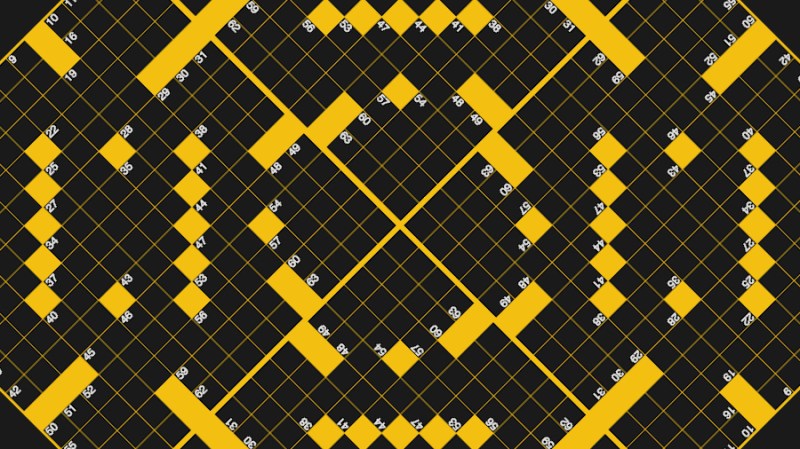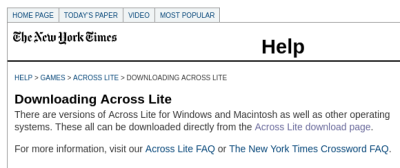
Over at the New York Times (NYT) crossword puzzle desk, newly-appointed Games Editorial Director Everdeen Mason has caused a bit of a ruckus and hubbub (both six letter words with U as the 2nd and 5th letter) among digital puzzle solvers. In a short article published in early August, Ms. Mason announced the end of support for the crossword-solving program Across Lite, abruptly terminating a relationship between the two organizations spanning 25 years. But the ramifications extend much deeper than just one application.
The NYT first published its now-famous crossword puzzle back in 1942, appearing every Sunday, and in 1950 it became a daily feature. In 1993, Will Shortz was chosen as the fourth Crossword Puzzle Editor, a position he still holds today. The NYT online crossword puzzles first appeared in 1996 — puzzle files could be downloaded by modem and solved offline using the program Across Lite.
 Modems aside, this basic method has continued until now, and a variety of programs and apps have sprung up over the years that allow not only offline play, but with tailored feature sets, such as support for the visually impaired, puzzle fanatics, puzzle creators, team playing, etc. Naturally the NYT joined the party as well, offering the crossword puzzles online and via smart phone apps.
Modems aside, this basic method has continued until now, and a variety of programs and apps have sprung up over the years that allow not only offline play, but with tailored feature sets, such as support for the visually impaired, puzzle fanatics, puzzle creators, team playing, etc. Naturally the NYT joined the party as well, offering the crossword puzzles online and via smart phone apps.
Central to this issue are Across Lite .puz files, a format which hasn’t been upgraded in twenty years. Despite being aged and proprietary, an entire community of solvers, developers and checkers has sprung up around the availability of puz files, making them a de-facto standard. Not only are puz files used to distribute daily crosswords, the NYT maintains an archive of all its crosswords in puz format going back to 1993, even before online puzzles were introduced. There are various newer formats floating around, but with the entrenchment of the puz format none has emerged as a clear winner. The Across Lite team even developed a new format at the request of NYT in back 2015, but strangely, the NYT has never used it.
Here One Day, Gone the Next
With this announcement, Ms. Mason wasn’t simply dropping support for Across Lite, but she appears to be killing off this entire ecosystem, much to the chagrin of puzzle fans. Her tweet a few days later attempted to explain the decision, but only seemed to agitate fans even further:
Hi. I’m the one who made this call and I did it for editorial reasons. I’m trying to build something where the editors can actual edit and make games rather than adapt things for tools we can’t control. It takes a lot of time, and I’m confident this is the best move for my team
Based on the information made available so far, several things don’t make sense to many in the community. Why the sudden notice, and not a transition period to give the community time to make an orderly transition to this new “something”? Why is the archive of puz files being removed, given that the problem is with preparing puz formatted files, not maintaining them? Almost overnight, scripts have popped up to convert the NYT website crossword into puz format, and similar scripts have been around for some time. This begs the question, just how difficult is it to prepare puz files? And other than printing your puzzle on paper, this announcement ends the ability to solve puzzles offline, such as when you’re flying.
Many third-party puzzle app and program developers have reached out to Ms. Mason asking that she reconsider. One such application, Puzzazz, asked to just receive any format at all, and their app can parse it. I think the Puzzazz founder Roy Leban sums things up nicely in his open statement on the NYT Crosswords situation:
We have never received any revenue from doing this — in fact, it costs us money every year. The Times, not Puzzazz, made money from every subscriber who solved in Puzzazz. We did it because we knew years ago that solvers switching to digital was inevitable (and we were clearly right), we believe that the best crossword should be available in the best app, we felt that solvers deserved to get the puzzle as intended by the editors, and that “a rising tide floats all boats.”
Empathizing with the Times
To be fair, I am not unsympathetic to Ms. Mason’s point of view. First of all, her responsibility is to oversee a suite of digital games and puzzles, not just the crossword. Supporting a 25-year-old file format, one whose proponents even admit is long in the tooth and needs updating, is a valid concern. I agree completely with Ms. Mason when she says her team should focus on their core mission — editing puzzles.
But this makes her decision to abandon successful and well-established third-party apps and file formats in order to develop new tools in-house seem incongruent. By all accounts, the current NYT puzzle apps and website are not stellar examples of the genre. I wonder if Ms. Mason’s team, which she admits is small and resource-limited, can satisfactorily fill the resulting void. Admittedly, I don’t have full visibility into all the facts and issues which lead up to this decision. But on the surface it seems to be questionable, or at least it is being poorly communicated.
When Will Shortz was hired in 1993, part of his mandate was to lead the NYT crossword puzzle into the digital era, a mandate at which he overwhelmingly succeeded. With the recent addition of logic games beyond just crosswords, we hope Everdeen Mason’s team will ultimately decide to build upon the past 25 years of success and community relationships instead of tossing them aside, and will keep in mind the adage “a rising tide floats all boats” while developing this new “something”. Will we see a new whiz-bang NYT puzzle format released to developers in the near future that heals these recent community rifts and improves the puzzle ecosystem for everyone? What is your opinion?
0 Commentaires